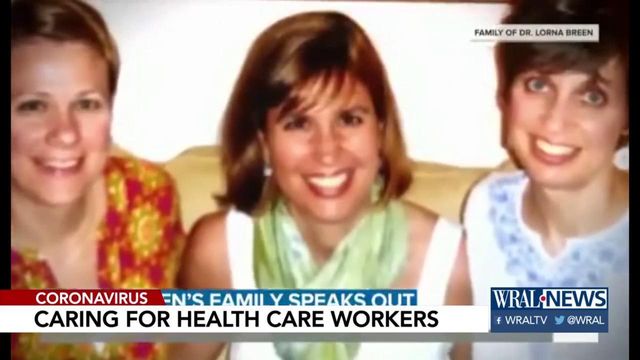Pandemic takes mental health toll on healthcare workers
The recent death by suicide of a New York ER doctor focused a national spotlight on the pandemic's mental health impact on those who care for COVID-19 patients. North Carolina healthcare workers are feeling overwhelmed, too.
Posted — UpdatedDr. Lorna Breen, on the frontlines of the New York outbreak – the deadliest in the US to date – battled the virus herself. She recovered and returned to work, but a short time later, she took her own life.
"She didn't want to give up. She would not give up," Breen's sister Jennifer Feist told NBC's Today Show. "She wouldn't let it break her, which of course it did."
Dr. Melissa Whitson is a psychology professor at the University of New Haven in Connecticut. She told WRAL News overwhelmed healthcare workers need to take care of themselves first.
"You’re encountering all these life-or-death situations and this helplessness about not being able to do a lot about it," Whitson said. "They're helping a lot of people, but of course, we tend to focus on the people we can’t help."
North Carolina healthcare workers are feeling overwhelmed, too.
Johnston Co nurse Amanda Hatem told WRAL News, "As a mom on my way home, I cry coming home because I don’t know if I’ve been in contact with somebody and I’m bringing it home to my kids."
"The mental health impact of the pandemic is serious," said Dr. Samantha Meltzer-Brody, the head of the UNC Department of Psychiatry.
She said hospitals are now creating mental health support programs specifically for their staff in hopes of reducing "the stigma about reaching out."
"This has nothing to do with whether I am strong enough or tough enough," Meltzer-Brody said. "This is called being a human being during a challenging time."
"We want to make sure we are able to support our entire workforce in having timely and accessible care that is confidential," Meltzer-Brody said.
Whitson said support services will likely be needed long after the pandemic has eased. Many healthcare workers haven't even had time yet to process what they've been through.
"Once things calm down a little bit more, people will reflect more, and some of those symptoms will come out," Whitson said. "I would not at all be surprised if we see a rise in cases of post-traumatic stress disorder and post-traumatic stress symptoms in healthcare workers in particular, now and in the future."
• Credits
Copyright 2024 by Capitol Broadcasting Company. All rights reserved. This material may not be published, broadcast, rewritten or redistributed.





